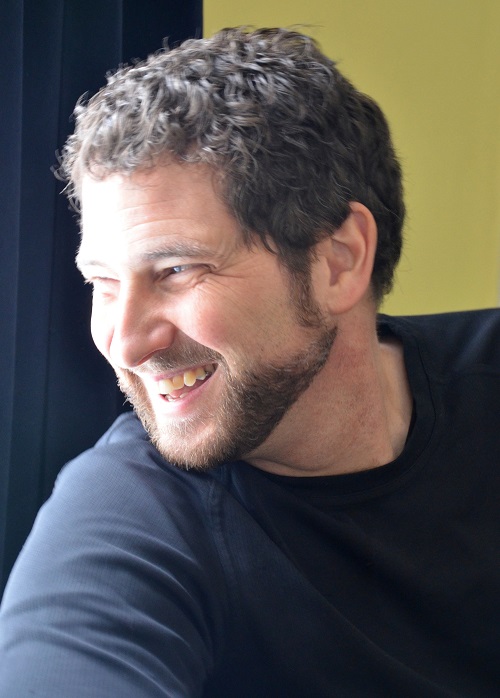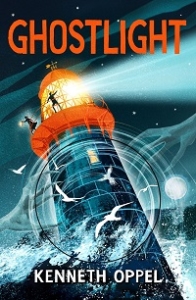
Ghostlight, an interview with Kenneth Oppel
Nicholas Tucker interviews Canadian author Kenneth Oppel about his new book, Ghostlight.
 Kenneth Oppel is best-known for his rousing adventure story Silverwing, published in 1997. Subtitled ‘How one small bat became a noble hero’, its small but determined hero flies, navigates and eats animal but talks and thinks human. He has to find his way back to the mother he became separated from after a series of near-disasters. Icy weather and the unwanted attentions of two murderous vampire bats twice his size add to his difficulties trying to work out where his colony had settled for their winter hibernation. But there are other concerns. Why have all the owls declared war against the bat kingdom? Why must he and every other bat never be allowed to see the sun? Does their Goddess Nocturna actually exist? How much worth is Her promise of eventual peace and happiness for all?
Kenneth Oppel is best-known for his rousing adventure story Silverwing, published in 1997. Subtitled ‘How one small bat became a noble hero’, its small but determined hero flies, navigates and eats animal but talks and thinks human. He has to find his way back to the mother he became separated from after a series of near-disasters. Icy weather and the unwanted attentions of two murderous vampire bats twice his size add to his difficulties trying to work out where his colony had settled for their winter hibernation. But there are other concerns. Why have all the owls declared war against the bat kingdom? Why must he and every other bat never be allowed to see the sun? Does their Goddess Nocturna actually exist? How much worth is Her promise of eventual peace and happiness for all?
Here then was an author well able to come up with exciting adventures while also adept in creating a powerfully imagined alternative fantasy world. Three more Silverwing stories followed, plus an animated television series and other novels. But Ghostlight, his latest, starts out in contemporary Toronto Island, where he now lives. Very soon three teenagers find themselves teaming up with Rebecca, also the same age but a lively ghost, having died in 1839. She warns them of Nicholas Viker, a repugnant fellow-ghost now out for world dominium. Rebecca’s lighthouse keeper father had tried to finish him off, but failed. How will the four teenagers, only three of whom are visible, manage to stop him?
There’s a lot to discuss when I finally managed to contact Ken, waiting patiently on the other side of the Atlantic as my precarious Zoom technology struggled through. Lighthouses have featured in several of his stories. What is it about them that attracts him?
Well, I was brought up on all the coasts of Canada. So I have always liked watery places, and lighthouses are part of the attraction. I also love the romance of lighthouses. Bastions of security on the edge of an often tumultuous sea, they are obvious symbols of endurance. And I enjoy those ghost stories that accumulate around them – episodes of untimely death and occasional madness all making for a good yarn. There’s something cosy about them too; those thick walls while a storm is raging outside. And believe it or not, I learned three weeks ago that I have lighthouse-keepers in my family. I’ve got this picture of my great great grandfather Uriah Young, who was the keeper for the Ironbound Island lighthouse in 1902.
Let’s talk about ghosts. Have you ever seen one?
No. Nor have I been to a séance. They both make good cinema though!
Most ghost stories are short, with the climax often put on hold until the last few moments. But Ghostlight is just over 400 pages. Did you ever worry that readers might find any initial shocks gradually tailing off due to over-familiarity?
I think of it more as an adventures story, with the focus on camaraderie plus an element of a treasure hunt as those kids search for that vital missing lighthouse lens. The length also allowed me to make ghost characters more rounded. I could show just a little empathy for Viker from time to time, for all his thwarted ambition and feelings of unfulfilment. With Rebecca too, I could bring in moments when other characters wondered whether she was quite as positive as she seemed. I wanted her to be a little bit scary. If you had been slumbering fitfully for two hundred years you would become quite frustrated and impatient. I didn’t want to pretend she could come out of all that as a Dalai Lama figure of wisdom and repose.
You also write about other things, such as the indigenous inhabitants who once lived on the same territory but have often been forgotten ever since.
Yes, and I also feel the book is something of a love letter to Toronto which is the place I have lived in longest. It does have a very interesting history, with plenty of gruesome stories of its own. There is a famous one concerning the Gibraltar Point lighthouse whose first keeper was murdered but neither his body nor his killers were ever found. That’s kind of what got me started: I had this ready-made scary plot which I then decided to chuck and start again on my own.
What about absent fathers? They seem to be crop up in a number of your stories, including this latest one.
It is one of the key relationships we have. And discovering that your parents are not infallible has always been an important stage of adolescence. I used to try to take parents out of my stories. They got in the way, making it harder for their children to act independently. But more and more now I am bringing parents and younger siblings back in. It’s harder work but I think the relationships that emerge are richer for it.
One reviewer has described this story as a ‘spirited read.’ That’s right on both counts! Are you planning a sequel?
I like to leave the door open at the end of any story, but that’s as far as it goes at the moment.
Might you return to writing animal stories?
I just go where the best story is. Some people have said that I have written in too many different genres. I have even been called a chameleon! I’m not sure if that’s a compliment or not. Spreading myself so widely may not be the best marketing policy these days, given that kids are so often looking for a particular niche in their writers. But I just get so interested in different kinds of stories, and then want to try them out. I’m starting next on a book for young readers, there’s also a novel for adults that I have been working on for some time and I’m doing a couple of graphic novel adaptations of my own books. So there’s a lot of projects going on, but I also feel I am kind of indolent at the moment too, and not unenjoyably so!
Ken is excellent company. His output over the years has been prodigious, so if there is anything like indolence at the moment in his life I am sure it will be temporary. Always writing in clear, uncluttered prose, ever-mindful of his readers’ needs for plenty of excitement along the way, he admirably bridges the gap between a child and adolescent readership. He seems certain to continue to do this for many more years to come.
Nicholas Tucker is honorary senior lecturer in Cultural and Community Studies at Sussex University.
Ghostlight is published by Guppy Books, 978-1913101763, £7.99 pbk.




